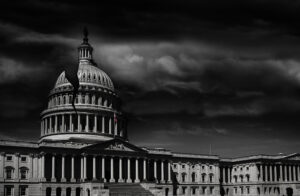 A country’s democratic systems of government age over time. It’s operational arteries, unable to adapt to a changing world, become sclerotic, and a cancer of vested interests invades the organs of government. No longer able to function for the good of all, democracies become increasingly distanced from the electorate at large.
A country’s democratic systems of government age over time. It’s operational arteries, unable to adapt to a changing world, become sclerotic, and a cancer of vested interests invades the organs of government. No longer able to function for the good of all, democracies become increasingly distanced from the electorate at large.
This is most apparent in two of the oldest democracies in the world: those of the USA and Great Britain. The USA’s democratic processes are showing the worst signs of distress. Its carefully structured systems of checks and balances have become gridlocked. Whatever President is elected, because the House of Representatives often has a Democratic majority and the Senate has a natural Republican bias, it is now rare that both Houses of Congress can agree any major legislative programme.
The US Supreme Court, by its Citizens United decision of 2010, gave companies the same electoral rights as ordinary citizens; this effectively allowed lobby groups to legally bribe Congressional candidates. The corruptive influence of money from business and the rich is now so ingrained in the American electoral system that, according to a 2015 poll, 52% of Americans believe that Congressmen are corrupt.
Britain is scarcely any better. In the British system Members of Parliament aspire to become government ministers. Hence, as it is damaging to their career prospects, government MPs rarely vote against their own side. This has given the executive inordinate power over the legislature. Scrutiny of legislation is poor, allowing Governments to ramrod their bills through the Commons. Curiously it is the unelected House of Lords which now provides the principal defence against bad legislation in the UK.
In Britain, as well, the wealthy are able to enhance the career prospects of their children by sending them to Private School. This has resulted in the creation of a class-based society based on wealth. For example, according to a Guardian report in 2019, nearly two thirds of Boris Johnson’s first cabinet went to Private School. As only 7 % of the population can afford private school fees, it seems that, as in America, those that have money and influence are able to unduly exercise power for their own benefit.
The result of this democratic sclerosis has been a discontented electorate, poor leadership and abysmal policy making. It is no coincidence that Britain and the USA have some of the worst records of all advanced countries in dealing with the Covid crisis.
The effectiveness of a country’s democracy can be measured by the security, health and wealth of its citizens. During the Covid crisis it has been manifestly clear that East Asian democracies looked after their citizens’ health and wealth much better than the older democracies of Western countries. It is also clear that Chinese power and influence is growing and poses a major threat to the West.
Western democratic governments need to develop the capability to diagnose the state of health of their systems of government and develop appropriate therapies. They will need to unblock arteries of communication to their electorate and reinvent their organs of administration, if they are to avoid continued decline in world power and influence.
